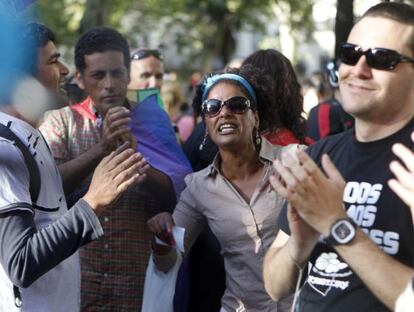Uruguayans protest court ruling favoring amnesty law
Around 200 Uruguayans are still missing from the military dictatorship

Thousands of Uruguayans took to the streets on Tuesday to join a demonstration in front of the Supreme Court in Montevideo in protest at a recent ruling that upholds a blanket amnesty for members of the country's past military dictatorship who committed human rights abuses.
In a four-to-one decision on Friday, the justices on the bench declared unconstitutional a 2011 law introduced by the ruling government coalition, which paved the way for prosecutions and trials against the former dictators and military to continue despite the 1986 amnesty that was later approved in a referendum.
President José Mujica's center-left Broad Front (FA) coalition in Congress supported the law. Mujica's wife, Lucía Topolansky, who is a senator, has called on lawmakers to put the Supreme Court justices on trial for blocking the measure.
Uruguay was ruled by a military dictatorship from 1973 to 1985. According to a national commission, some 200 Uruguayans are still missing from that period. But human rights groups believe the real figure is closer to 500.
Cracks in coalition
Elena Zafaroni, the head of an organization that groups together families of the disappeared, said that she suspected there were many in the FA coalition who were actually pushing to have the law revoked and keep past crimes from being investigated.
Zafaroni, who lost her husband during the dictatorship, said she grew suspicious that the Supreme Court was moving to throw out the law when Judge Mariana Mota, who began investigating some 50 cases of disappearances and illegal arrests, was transferred from the criminal to the civil division on February 15.
"It may be difficult for someone abroad to understand this," said Alfonso Lessa, a journalist who has written four books about the dictatorship and Uruguay's recent political history. "The approval of the amnesty took place some 27 years ago and the coup occurred some 40 years back - that is ancient history for many young people. The Broad Front was pressured by some radical sectors to approve the 2011 law, but in reality there is another sector of the Front which, although it won't publicly acknowledge it, is in favor of keeping the amnesty and agrees with the Supreme Court decision."
Tu suscripción se está usando en otro dispositivo
¿Quieres añadir otro usuario a tu suscripción?
Si continúas leyendo en este dispositivo, no se podrá leer en el otro.
FlechaTu suscripción se está usando en otro dispositivo y solo puedes acceder a EL PAÍS desde un dispositivo a la vez.
Si quieres compartir tu cuenta, cambia tu suscripción a la modalidad Premium, así podrás añadir otro usuario. Cada uno accederá con su propia cuenta de email, lo que os permitirá personalizar vuestra experiencia en EL PAÍS.
¿Tienes una suscripción de empresa? Accede aquí para contratar más cuentas.
En el caso de no saber quién está usando tu cuenta, te recomendamos cambiar tu contraseña aquí.
Si decides continuar compartiendo tu cuenta, este mensaje se mostrará en tu dispositivo y en el de la otra persona que está usando tu cuenta de forma indefinida, afectando a tu experiencia de lectura. Puedes consultar aquí los términos y condiciones de la suscripción digital.








































